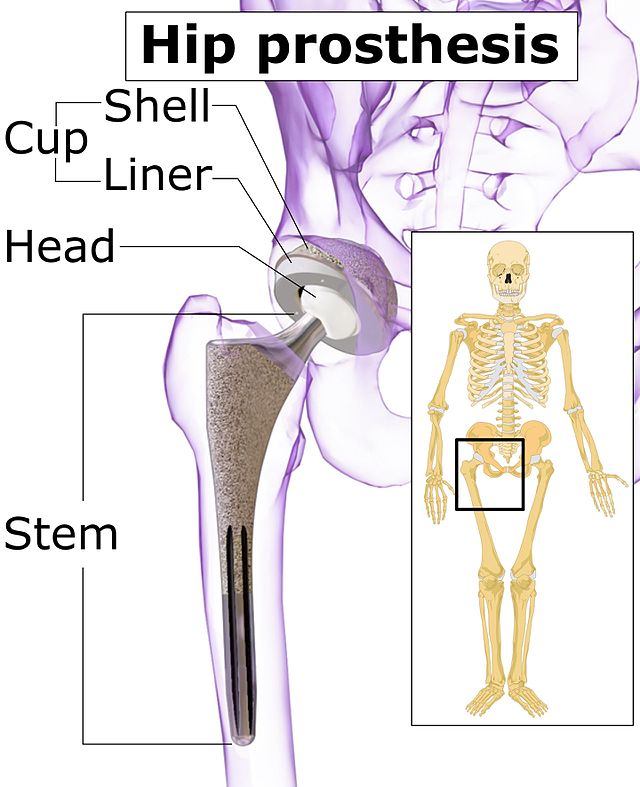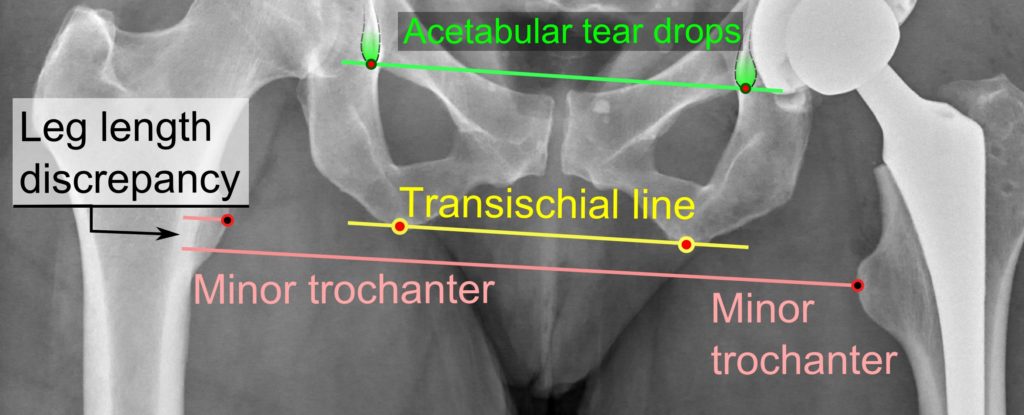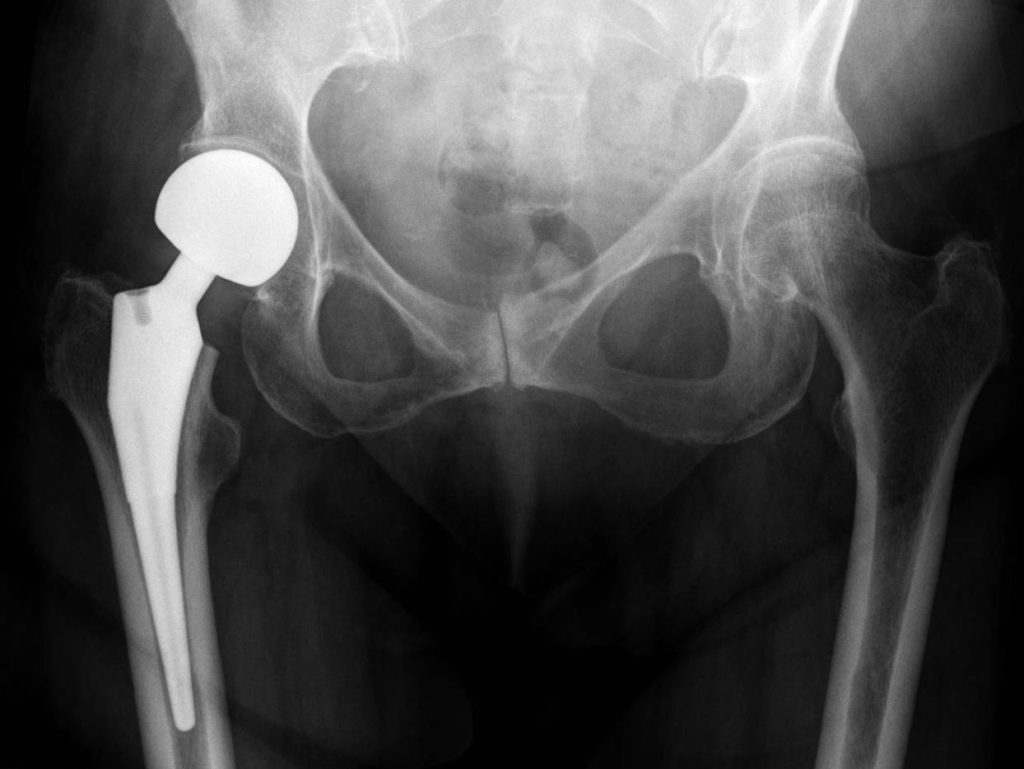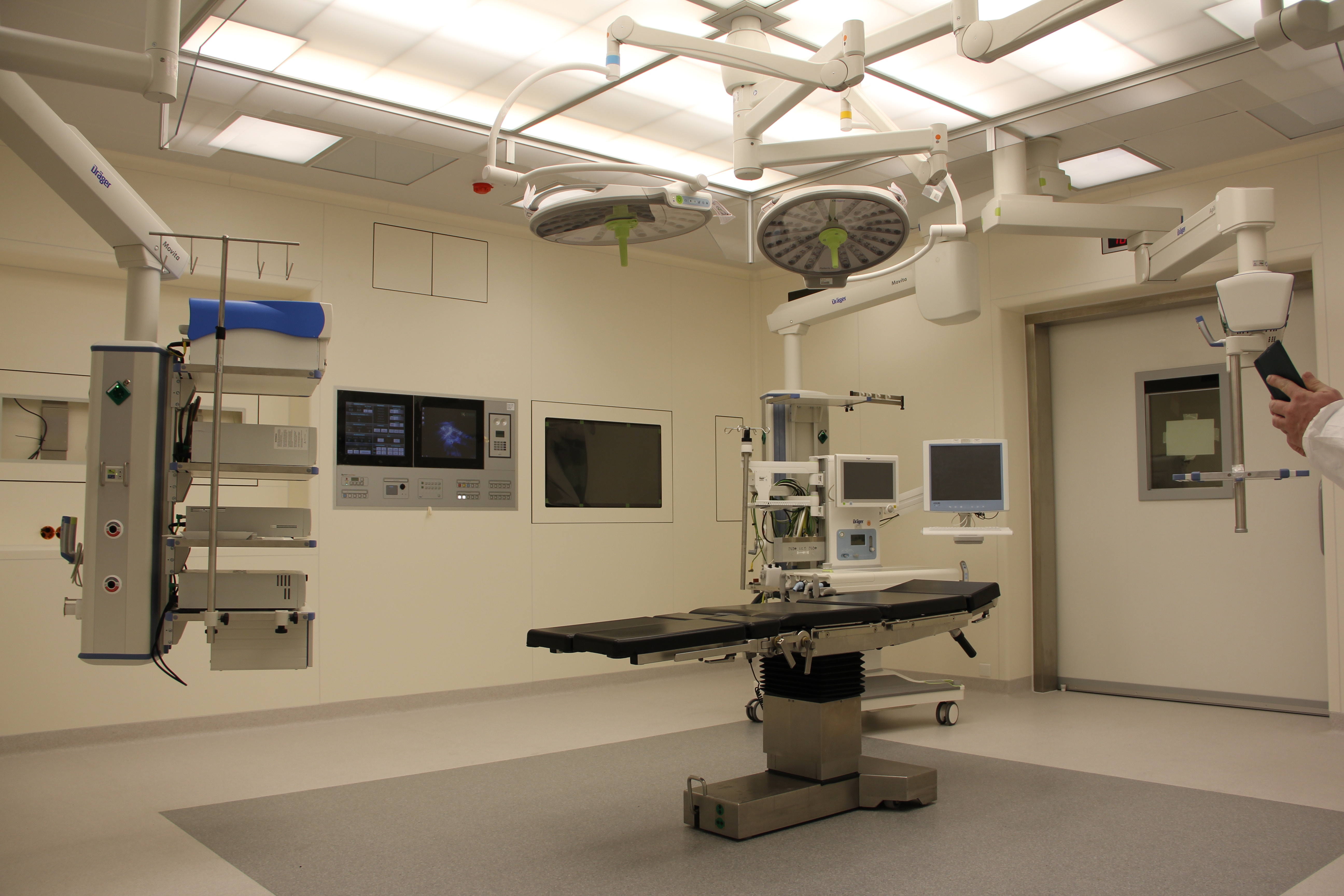The number of people living in the United States needing hip replacement surgery (also known as hip arthroplasty) has skyrocketed in recent years, jumping from 310,800 in 2010 to more than 450,000 per year in 2020 according to a report from the Agency for Healthcare Research and Quality. The average age of patients undergoing hip replacement surgery is also falling, from 66 to now just under 65. More men are also undergoing this type of operation than in the past as well.
While the surgery is meant to relieve ongoing pain in the hip and difficulty walking, when performed negligently or “below the standard of care” the procedure can leave you or a loved one in worse shape than before the surgery.
Table of Contents
Common Questions About Hip Replacement Surgery
What is hip replacement surgery?
A hip replacement surgery, or total hip arthroplasty, is a surgical procedure that involves replacing a damaged or deteriorated hip joint with a carefully designed artificial joint or prosthesis. This innovative procedure is commonly recommended to alleviate chronic pain, restore mobility, and significantly improve the overall quality of life for individuals affected by hip joint conditions, including but not limited to osteoarthritis, rheumatoid arthritis, hip fractures, or hip dysplasia.
When is a hip replacement required?
Hip replacement is usually recommended when an individual endures severe hip pain, reduced mobility, and a diminished quality of life due to various hip joint issues. These issues encompass osteoarthritis, rheumatoid arthritis, hip fractures, avascular necrosis, and congenital hip conditions. The decision to undergo a hip replacement is typically made after a thorough evaluation by a medical professional, considering the severity of the condition and the patient’s circumstances.

using source image by BruceBlaushttps://commons.wikimedia.org/wiki/User:BruceBlaus
via CC BY-SA 4.0 license https://creativecommons.org/licenses/by-sa/4.0/
How common is hip replacement surgery in the United States?
According to the American College of Rheumatology, over 450,000 hip replacements are performed annually in the U.S. This number continues to grow as our population ages. It is one of the most frequently conducted orthopedic surgeries.
What are the different types of hip replacement procedures?
There are several types of hip replacement procedures, including total hip replacement (THR), partial hip replacement, minimally invasive hip replacement, and revision hip replacement. The recommended method depends on the individual’s condition and the extent of hip joint damage.
What are the potential complications and risks associated with hip replacement surgery?
Hip replacement surgeries, like all medical procedures, come with inherent risks. Potential complications may include infection, blood clots, hip joint dislocation, implant failure, nerve damage, and adverse reactions to anesthesia or medication. It’s crucial to discuss these risks with your healthcare provider before undergoing the surgery.
About Hip Surgery Medical Malpractice Claims
Do I Have a Medical Malpractice Claim For a Hip Replacement?
Complications from hip replacement surgery can have a devastating impact on your life. These complications often require revision surgeries, which add additional costs, pain, suffering, and time to your recovery.
Of course, not all complications from a hip replacement surgery are due to malpractice. Every surgery comes with its own set of risks and known side effects. In order to file a malpractice claim, your case will need to meet the criteria for a medical malpractice lawsuit.

What Constitutes Medical Malpractice?
In order to prove medical malpractice, you must prove that the defendant failed in their “duty of care” towards you. The duty of care is the reasonable standard of care that any doctor would be expected to provide in a given situation, meaning that, given the information they had, the surgeon followed best medical practices.
Medical malpractice lawsuits can be filed when:
- The duty of care is breached by your medical provider. This can be your surgeon, the hospital where your surgery took place, or the staff at the hospital.
- The duty of care was breached due to negligence or carelessness.
- The breach of the duty of care was the direct and explicit cause of the injuries you suffered.
- Finally, you must prove that you suffered actual damages, quantified in monetary amounts. Both economic damages and non-economic damages must be quantified.
Additionally, the statute of limitations for medical malpractice lawsuits is two years from the date of the injury, so your medical malpractice claim must be filed by that date.
What are the most common reasons for medical malpractice in hip replacement surgeries?
Medical malpractice in hip replacement surgeries can occur due to various factors, including surgical errors, improper prosthesis selection, inadequate pre-operative assessments, postoperative complications, and anesthesia or postoperative care issues. Cases of malpractice may involve negligence by surgeons, nurses, anesthesiologists, or healthcare facilities.
What should I do if I suspect medical malpractice in my hip replacement procedure?
If you suspect medical malpractice in your hip replacement procedure, take the following steps:
- Seek immediate medical attention to address any complications.
- Document all details, including medical records, surgery notes, and communications with healthcare providers.
- Preserve any physical evidence, such as the prosthetic joint.
- Consult with a medical malpractice attorney to discuss your case.
Common Hip Replacement Problems
What If I Have A Leg Length Discrepancy Following a Hip Replacement Surgery?
One common type of malpractice related to hip replacement surgery involves having a leg length discrepancy after the procedure is done. Leg length discrepancy following hip replacement surgery is unfortunately not an uncommon occurrence, and is not necessarily in and of itself an indicator of negligence.
However when the leg length discrepancy is significant enough – typically one inch or greater – it could be due to physician malpractice. A leg length discrepancy of this magnitude could be due to negligence. And even if there was no negligence on the part of the physician in causing the leg length discrepancy, you may still have cause to file a malpractice claim if the surgeon did not recognize or diagnose the leg length discrepancy properly.
Diagnosing and Treating Leg Length Discrepancy After a Hip Replacement
Doctors can diagnose a leg length discrepancy by analyzing how you walk (your gait), measuring your legs, or performing imaging studies on your leg such as X-Rays.
Leg length discrepancies are typically treated through a shoe lift. A significant discrepancy, however, may mean you may need more extensive treatment, such as a hip revision surgery, to correct the discrepancy. If the leg length discrepancy is not corrected, it could cause serious complications.

What Issues Does a Leg Length Discrepancy Cause?
Leg length discrepancies can cause issues walking, as well as hip and knee pain. The uneven, unbalanced gait due to a leg length discrepancy may also put extra pressure on the nerves in your lumbar spine, and may lead to low back and leg pain due to a pinching of those nerves. Additionally, leg length discrepancies are associated with:
- Sciatica
- Neuritis
- Dislocation
- Early loosening of hip replacement components
These potential issues make it critically important for a doctor to properly diagnose and treat a leg length discrepancy before the problems become worse. These can have such a dramatic impact on daily life that many people file leg-length discrepancy claims.
Can a Hip Replacement Be the Wrong Size?
Leg length discrepancies are unfortunately not the only complication of a hip replacement surgery. Some patients have undergone a hip replacement, only to find that their surgeon used the wrong size hip replacement.
A hip replacement that is the wrong size can also lead to unequal leg lengths, eventually leading to the above issues if not corrected in a timely manner. But using the wrong sized hip replacement can lead to additional problems as well. When a hip replacement is the wrong size, it can also leave you with a hip that has poor rotational control, which in turn can lead to a rotational deformity of your leg (for example resulting in your foot facing at a 60 degree angle). This can also lead to gait issues that put added stress on your back.
Some hip replacements that are the wrong size can also lead to inflammation and crippling pain for patients, leaving them in worse shape than they started.
Loose Hip Implants
When the components of the hip replacement have loose components, it can cause great discomfort and pain for patients. This typically occurs immediately after surgery, and is often because the components in the replacement were never stable to begin with. This may be an issue with the manufacturer of the hip replacement implant, rather than negligence on the part of the surgeon who did your procedure. In these cases, you may need to file a product liability lawsuit, rather than a negligence claim.
Metal-on-Metal Implants (MoM)
Metal-on-Metal hip implants are no longer used in the United States, but were used up until May 18, 2016.
These implants have a joint made of two metal surfaces, and when these types of implants were introduced, they touted a longer lifespan and a decreased risk of dislocation. While all hip implants will wear down over time, many MoM implants were actually found to deteriorate quickly, and upon doing so, they released metal ions into patients bloodstreams.
While these implants are no longer sold in the United States, there are an estimated 1.5 million people that still have MoM hip implants. Patients with MoM implants should be advised by their doctor to check in frequently if they start noticing discomfort with their implant.

Questions About Hip Replacement Malpractice Cases in Pennsylvania
What is the statute of limitations for filing a medical malpractice claim related to a hip replacement surgery in PA?
The statute of limitations for filing a lawsuit for medical malpractice in Pennsylvania is two years from when the malpractice was first discovered or should have been discovered. It’s crucial to consult with a PA Medical Malpractice attorney promptly to determine the applicable deadline for your case.
How can a medical malpractice attorney help me with my hip replacement case?
A medical malpractice lawyer specializes in handling cases involving medical negligence.
They can assist you by:
- Evaluating the merit of your case.
- Gathering and reviewing medical records and evidence.
- Consulting with expert witnesses to assess the standard of care.
- Negotiating with insurance companies.
- Representing you in court, if necessary, to seek compensation for your injuries.
What damages can be recovered in a hip replacement medical malpractice lawsuit?
In a medical malpractice lawsuit related to hip replacement, you may be eligible to recover various damages, including:
- Medical expenses (past and future).
- Lost income or earning capacity.
- Pain and suffering.
- Rehabilitation and physical therapy costs.
- Costs of corrective surgeries or treatments.
- Emotional distress and loss of quality of life.
How long does resolving a hip replacement medical malpractice case take?
The timeline for resolving a medical malpractice case can vary significantly. Some cases may settle relatively quickly, while others may take years, especially if they go to trial. The complexity of the case, the willingness of the parties to negotiate, and court availability all play a role in the duration of the process.
How can I find a qualified medical malpractice attorney to handle my hip replacement case?
To find a qualified medical malpractice lawyer:
- Ask for referrals from friends, family, or healthcare professionals.
- Research local law firms with experience in medical malpractice cases.
- Check online attorney directories and review websites for client feedback.
- Schedule consultations with potential attorneys to discuss your case.
What is the process for filing and pursuing a medical malpractice claim related to a hip replacement procedure?
The typical process includes:
- Consultation with a medical malpractice attorney to evaluate your case.
- Investigation of the case, including gathering evidence and consulting with experts.
- Filing a complaint in court if a settlement cannot be reached.
- Discovery, where both parties exchange evidence and witness statements.
- Negotiations for a settlement or proceeding to trial if necessary.
Hip Replacement Lawyers
Determining whether the wrong sized hip replacement was used, or whether your issues were just an unfortunate complication of the surgery, will require an extensive review of your case. This includes reviewing the medical records, X-Rays and other imaging studies, along with the size of the components used in any subsequent revision surgeries to fix your issues following your initial hip replacement surgery.
Expert testimony will be critical in proving your case. Attorneys experienced in handling medical malpractice claims will be able to consult with orthopedic surgeons and other specialists who aren experienced in performing hip replacement surgeries, to help determine whether or not there was negligence in your case.
A botched hip replacement surgery can not only have an effect on the joys of your daily life, but may also have a long-term effect on your ability to work and earn income. If you or a loved one suffered injuries due to negligence from a surgery, you should consult an attorney as soon as possible. The Thistle Law Firm is experienced in handling medical malpractice claims related to hip replacement surgeries. If you or a loved one suffered serious harm due to negligent care during a hip replacement surgery, the attorneys at The Thistle Law Firm are here to take your call at 215-525-6824. We can also be reached online via our contact form.

Dan Thistle grew up in Montgomery County, Pennsylvania and is a graduate of St. Joseph’s Preparatory School and the University of Pennsylvania. After graduating from Penn, Dan followed in his father’s footsteps and attended the Villanova University School of Law. In October, 2006, he was privileged to join him as a member of The Thistle Law Firm.


